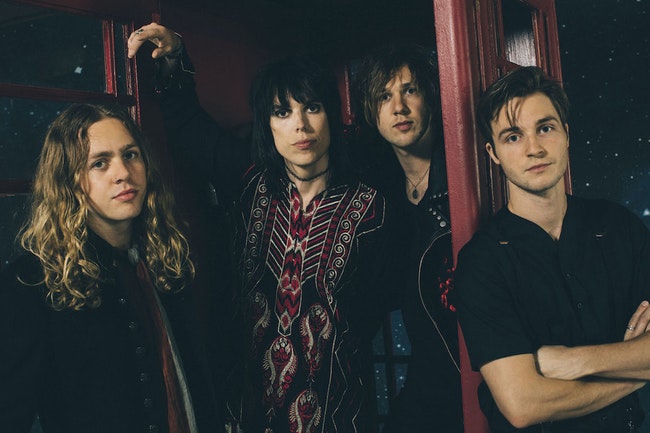Cover Story and Gallery: The Struts
It was a popular, yet perhaps far-fetched concept that was titillating impressionable society a few years back. And it was relatively simple, all told, and loosely based on comic Danny Wallace’s book Yes Man, which was later satirized to a zanier degree in Jim Carrey’s film version of the same name: If you simply responded to every task, proposal or invitation you were pitched positively instead of negatively, you could theoretically change your life for the better. In short, say yes to everything, big or small, like ‘Want to go skydiving this weekend?’ or ‘Now’s a good time of year to visit Borneo,’ and, well, what’s the worst that could happen? Push your boundaries beyond the comfort zone and magically transform yourself into a better person. Testimonies were popping up everywhere of meek Walter Mittys who were now Herculean — or at least relatively happy — after a year of agreeing to everything.
Luke Spiller likes this concept. In theory as well as practice. Not that the British musician has spare days he can devote to acquiescence — his schedule as the lead singer of The Struts is jam-packed for months to come coinciding with the late-October release of its glam-rocking sophomore set for Interscope, Young & Dangerous. But he’s had nothing but great result by saying yes to initially left-field requests. He swears it’s true. “I mean, there’s definitely a line that you should not cross,” he says. “So if I said yes to everything, it would be insane. You should see all the people who contact me through Instagram alone, going, ‘Hey buddy — ya wanna go for a beer before the show?’ Complete strangers. And I’m like, ‘Ummm…I don’t really know you!’ I wouldn’t say I’m frightened, but it’s just common sense, isn’t it? But otherwise, I’m down. I’m always down.”
Make no mistake, Spiller is the kind of guy fans want to be seen hanging out with, an honest to goodness old-school rock star, even if it’s just for a quick selfie at the merch table. Retro-minded to a fault, he’s got the dashing good looks and chiseled cheekbones of a young John Barrymore. The fringe-jacketed, shag-haired sartorial style of his idols from another era, like Bowie, Bolan, and Night at the Opera/*Day at the Races-circa Freddie Mercury (whose classic Queen costumer, Dame Zandra Rhodes, was so impressed with his “star” quality she came out of retirement to design special stage outfits for him; he still can’t quite believe his good fortune). “And the ironic thing is, I tend to be a hermit, for the most part,” says the bon vivant, who lives in Los Angeles with his girlfriend of four years, model Laura Cartier Millon (in 2015, Interscope wisely transplanted Spiller and his bandmates, guitarist Adam Slack, bassist Jed Elliott, and drummer Gethin Davies). “But if I genuinely like someone, and I see something in them that I admire and find interesting, I will go out of my way to make some sort of connection and build a relationship, just like I would with anyone.” Or, to put it another way, he elaborates, “I’m not someone who would go to a certain dinner because so and so there was very important, or so and so could do something for me. I’ve turned down meetings with a lot of people that others would view as important just because they don’t really interest me. My spare time is rare, and I want to use it accordingly, making myself happy.”
And that’s how pop diva Kesha wound up on a slamming remix of the Young track “Body Talks.” It was pure, inexplicable serendipity Spiller recalls. And sort of complicated. A guitarist friend who had backed another artist on an earlier Struts tour bumped into the group a year ago, but when Spiller inquired how said performer was doing, he said that he wasn’t sure. “He goes, ‘I’m with Kesha now. Wanna meet her?’” Spiller says. He said yes. “And Kesha had already heard about us — she’s a big rock chick, and she loves Zeppelin and all this big rock stuff. So we were kind of like musical kindred spirits, and when we asked her to be on the song, she said yes, too.” On a day off from touring, Spiller flew to Hollywood to cut the vocal with her. She apologized that she hadn’t even listened to the chorus yet, which startled him at first. “But then she said, ‘When I was asked whether I wanted to do this song or not, I just listened to the first four bars and said, ‘Yes. I’m in.’ I thought that was pretty funny.”
Spiller and Million certainly hadn’t planned on spending the holidays in Hawaii a couple of years ago. But again, he felt good vibes from studio whiz Marti Frederiksen, and therefore unusually receptive to his spur of the moment ideas. Only three days after I met him, Marti goes, ‘Hey, man — what are you doing at Christmas?’ I said I didn’t know – it was still a month off. And he said, ‘You should come out and stay with me on Maui — it’ll be sweet!’ So I was like, ‘Yeah! Alright! You’re on!’ So after the last show of the tour, me and Laura headed on out.” Pause for dramatic effect. “And ended up having one of the most incredible vacations of our lives!” No hyperbole. Frederiksen just happened to be working with another Spiller hero, a Mr. Steven Tyler, who was spending his Yuletide recording solo experiments like a hushed acoustic version of the Aerosmith “Dream On.” The couple was duly dumbfounded.
Being cut from the same Jagger-flashy cloth, Spiller and Tyler instantly hit it off. “And I ended up becoming part of his small entourage on the island,” marvels the Strut, who — odd for his generation — has a deep, abiding respect for his rock and roll elders. “It was such a bizarre, surreal experience because we were doing all the usual things there, like meeting up and having breakfast. But I got to witness him in the studio, Marti’s home-made studio in his condo, and that was an interesting experience, watching Steven’s microphone technique and how quietly he actually sings. He has amazing control over what he does, and in terms of raw projection, he doesn’t shout and scream as much as people would expect. So it’s really down to just pure, incredible technique, which is why he can still do this at the age he is. I found it very inspiring.”
And that might be this artist’s most likable attribute — his innate humility and eager willingness to learn. He doesn’t see his relationship with Tyler as teacher/student, exactly. But they have become good friends; he says, “Although I don’t get to see him as often as I’d like.” Spiller has also befriended another Hawaii-based legend (and you’d be surprised how many rockers call the place home, starting with Todd Rundgren) — gregarious Alice Cooper manager Shep Gordon, whose regular lanai-held dinner parties are dirty who’s who of film and music talent who happened to be on the Island that particular week. And Gordon has one strict rule concerning his think-tank-ish get-togethers — no business shall be conducted at any point during the evening. No joke. Cut a deal and get bounced. Naturally, through him, The Struts met Cooper himself, who was playing Las Vegas the same day the quartet was filming the video for its recent “Freak Like You” single, a celebration of all things — and people — deemed too eccentric for public consumption. “So I just walked over to him and said, ‘Hey — would you like to be in our new music video?’ And he loves the band, so he was like, ‘Yeah! Let’s do it!’ So we did a whole bunch of stuff. He was supposed to be playing my dad in the video, but it was so rushed. Still, we ended up with these incredible scenes, like where he was showing me how to use these throwing knives backstage. It was really cool.”
Although he grew up in a religious household, Spiller knows his heavy-metal history. Maybe when you’re denied the exotic music you love as a child, it makes you fight that much harder to find it, and treasure it like gold once you’ve secured it. Because throughout an average conversation with him, he can go on at length about the compressed space that’s tangible on every AC/DC album, contradicting the concept that they’re just a wall of noise — they’re actually skeletal, serpentine riffs held together by an undulating melody line. This time, he’s up for chatting about one of rockdom’s most crucial collections — the first four Aerosmith albums, masterpieces one and all, from the brutal experimentation of its underrated sophomore disc Get Your Wigs to the definitive, gutter-trashy Rocks, which showcases the Tyler/Joe Perry Toxic Twins songwriting at the height of its creativity. “Those were fantastic, timeless rock records,” he sighs. “And they’re all very different from the later ones, like Done With Mirrors, where Desmond Child was getting involved.”
Younger Struts fans might not recall the halcyon era of Child, of Desmond Child and Rouge, or the cold, clinical term ‘song doctor,’ the task he was hired to do in the ‘80s and ‘90s for composers who had lost their once-proud mojo. Sure, there were negative showbiz connotations to such terminology, pre-Max Martin. But don’t jump to conclusions about how Spiller views Child, who met him in Nashville — the base camp for song doctors, essentially — and started inviting him out for dinner when The Struts were in town. You might predict a negative response, but you’d be wrong. He’s said yes every single time, and today considers Child a close chum, an ally, and a misunderstood legend who knows more about songwriting than he’ll ever learn. And Spiller seriously wants to discover exactly what makes a great chart hit click. “Now every time I go to Nashville, I try to meet up with him,” Spiller says, adding that Frederiksen is often along for the conversational ride, “So we have these big boozy dinners, and we talk.” Correction, he coughs. “I just sit back and listen to Marti and Desmond talk and tell all these amazing stories that they’ve got. I can’t help but soak it all up like a sponge. And I get inspired by it.”
With his longtime collaborator Slack, Spiller became a solid tunesmith himself, in a chiming style that combines the symphonic-sweet of E.L.O., the exaggerated ‘70s glam of Sweet and Slade, plus the punky modern pluck of The Strokes, all steeped overnight in some Sigue Sigue Sputnik sauce. He’d come of age in the ho-hum hamlet of Bristol, where he began imitating the late Bon Scott in his teens — the perfect role model for the risqué double entendre wordplay he would conceive with Slack, once the two met then moved in together for a three-year gestation period in 2009. Before the group had even released the Mach One 2014 edition of Everybody Wants, it had opened for The Rolling Stones in Paris. Then — as the demand grew — it found itself appearing alongside The Who, Guns N’ Roses, and even The Foo Fighters, with whom Spiller performed a heartfelt, non-ironic version of the old Queen/Bowie duet “Under Pressure,” a song that could easily sound tongue in cheek spoofed in callous hands. But Spiller – like Dave Grohl — instinctively understood the hit’s importance, and, as he attacked it with his own idiosyncratic Cockney-accented, rolling-R’ed vocal style, “Under Pressure” was somehow elevated to the next elegiac level for a generation of fans that never heard it before or won’t until the sales-looking new Freddie Mercury biopic Bohemian Rhapsody hits theaters. But Spiller originals like “Kiss This,” “Dirty Sexy Money,” and “Could Have Been Me” were every bit as sing-song memorable. And — just in case you missed the chic cheeseball glamor of where they were coming from — Spiller and company actually wore their heart on their candied sleeve with a dead-on cover of Sweet’s “Ballroom Blitz” for the Edge of Seventeen soundtrack. One must always acknowledge one’s ancestors. It’s just an excellent aesthetic protocol.
The Struts giddily keep the Brian Connolly momentum going on Young & Dangerous, until the only things missing are Christopher Walken and more cowbell. Adjacent to handclap-propelled anthems like “Body Talks” sits more sobering material, such as “Freak Like You,” “Who Am I?,” “Tatler Magazine,” and “In Love With a Camera,” allowing Spiller to weigh in on his celebrity, indicting his own lifestyle a bit in the process. Spiller didn’t waste any time on undertaking the Wants followup — he’s been composing mid-tour, trying to get a handle on a theme. Because, as the saying goes, you have your entire life to come up with your first album, then a few short months of scrambling to arrive at its successor. “So your second and third albums are always written in a moment in time, but what you find is, the things that are written in a small space in time are usually the strongest,” he says. “So a lot of the real standout tracks on Young & Dangerous were ones that I finished late in the creative process — some of them were flea ting around for well over a year, but they were finalized with the music and vocals just as the album was being handed in. In perfect Struts fashion, everything happened last minute.”
On record — and on tour — Spiller is returning to two of his favorite instruments, piano, and harmonica, which takes him back to the UK pub circuit where he and Slack first tested out the then-harp-honking Struts sound. “When we first met, we used to blues jam at those local pubs,” he adds. “And it was one of those things where we would just look at each other and think, ‘Why in the fuck haven’t we done this before? It sounds really cool,” he recollects. The revival of keyboards is crucial, he says, “When I was 19 or 20 and making my own demos, learning the craft of what makes a song a song, I was always writing them on piano — I rarely picked up a guitar, which is weird because my dad’s a guitar player,” he continues. Now he’s openly embracing the instrument again.
He’s also saying “yes” whenever possible, or potentially life-altering. And he confesses that he’s agreed to a few boundary-pushing experiments here and there that, at least on the surface, seem pretty preposterous. Desmond Child alone has transformed his entire studio style. “I have learned truckloads from that man,” Spiller concludes. “I’ve learned about the importance of believing in the words that you’re singing. He was incredibly camp, and we would sit there in the studio writing out our lyrics, and then we’d have these Shakespeare monologues, where we read those lyrics aloud. It was like we were performing in some London theater.
“But his reasoning was if you can’t stand up and recite your lyrics with extreme emotion, then how in the hell are you ever going to sing them convincingly to an audience? So that’s something I’ve definitely taken into the studio with me. And I get a lot of funny looks, but hey! It works!”
The Struts appear at House of Blues Chicago Nov 23 and 24
-Tom Lanham
Category: Cover Story, Featured, Features

























































